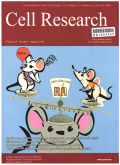- 钛学术文献服务平台 \
- 学术期刊 \
- 基础科学期刊 \
- 生物科学期刊 \
- 细胞研究(英文版)期刊 \
Mechanisms of Polycomb group protein function in cancer
Mechanisms of Polycomb group protein function in cancer
基本信息来源于合作网站,原文需代理用户跳转至来源网站获取
摘要:
Cancer arises from a multitude of disorders resulting in loss of differentiation and a stem cell-like phenotype characterized by uncontrolled growth.Polycomb Group(PcG)proteins are members of multiprotein complexes that are highly conserved throughout evolution.Historically,they have been described as essential for maintaining epigenetic cellular memory by locking homeotic genes in a transcriptionally repressed state.What was initially thought to be a function restricted to a few target genes,subsequently turned out to be of much broader relevance,since the main role of PcG complexes is to ensure a dynamically choregraphed spatio-temporal regulation of their numerous target genes during development.Their ability to modify chromatin landscapes and refine the expression of master genes controlling major switches in cellular decisions under physiological conditions is often misregulated in tumors.Surprisingly,their functional implication in the initiation and progression of cancer may be either dependent on Polycomb complexes,or specific for a subunit that acts independently of other PcG members.In this review,we describe how misregulated Polycomb proteins play a pleiotropic role in cancer by altering a broad spectrum of biological processes such as the proliferation-differentiation balance,metabolism and the immune response,all of which are crucial in tumor progression.We also illustrate how interfering with PcG functions can provide a powerful strategy to counter tumor progression.

推荐文章
Polycomb Group蛋白复合体与干细胞的发育调控
Polycomb group蛋白
干细胞
基因沉默
表观遗传修饰
Polycomb家族基因Nspcl在斑马鱼早期发育的表达
Polycomb
Nspcl
斑马鱼
神经系统发育
Basic formation mechanisms of Lake Doroninskoye soda water, East Siberia, Russia
Saline lake
Sulfate reduction
Thermodynamic equilibrium
内容分析
关键词云
关键词热度
相关文献总数
(/次)
(/年)
引文网络
引文网络
二级参考文献 (0)
共引文献 (0)
参考文献 (0)
节点文献
引证文献 (0)
同被引文献 (0)
二级引证文献 (0)
2022(0)
- 参考文献(0)
- 二级参考文献(0)
- 引证文献(0)
- 二级引证文献(0)
引文网络交叉学科
相关学者/机构
期刊影响力
细胞研究(英文版)
主办单位:
中国科学院上海生化细胞所
出版周期:
月刊
ISSN:
1001-0602
CN:
31-1568/Q
开本:
16开
出版地:
上海岳阳路319号中科院上海生命科学研究院31B,401室
邮发代号:
4-645
创刊时间:
1990
语种:
eng
出版文献量(篇)
2692
总下载数(次)
0
总被引数(次)
40708
期刊文献
相关文献
推荐文献
- 期刊分类
- 期刊(年)
- 期刊(期)
- 期刊推荐
力学
化学
地球物理学
地质学
基础科学综合
大学学报
天文学
天文学、地球科学
数学
气象学
海洋学
物理学
生物学
生物科学
自然地理学和测绘学
自然科学总论
自然科学理论与方法
资源科学
非线性科学与系统科学
细胞研究(英文版)2022
细胞研究(英文版)2021
细胞研究(英文版)2020
细胞研究(英文版)2019
细胞研究(英文版)2018
细胞研究(英文版)2017
细胞研究(英文版)2016
细胞研究(英文版)2015
细胞研究(英文版)2014
细胞研究(英文版)2013
细胞研究(英文版)2012
细胞研究(英文版)2011
细胞研究(英文版)2010
细胞研究(英文版)2009
细胞研究(英文版)2008
细胞研究(英文版)2007
细胞研究(英文版)2006
细胞研究(英文版)2005
细胞研究(英文版)2004
细胞研究(英文版)2003
细胞研究(英文版)2002
细胞研究(英文版)2001
细胞研究(英文版)2000

 免费查重
免费查重










